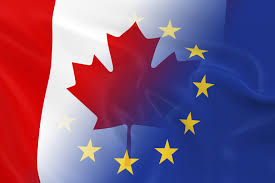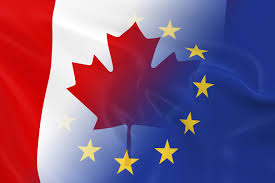
Following the failure of the Belgian federal government to win the consent of French-speaking regional authorities, the European Union's hopes of signing a landmark free trade deal with Canada this week appeared to evaporate on Monday.
To resolve the impasse, Belgian Prime Minister Charles Michel had been given until Monday, three days before the planned signing, by European Council President Donald Tusk. But there was stalemate in a meeting Michel hosted with leaders of the five sub-federal authorities whose permission he needs to go ahead.
Although all sides insist that the CETA pact, seven years in the making, remains in everyone's interest, Tusk is now expected to contact Canadian Prime Minister Justin Trudeau and call off an EU-Canada summit that was scheduled for Thursday in Brussels.
"We cannot give a yes," Paul Magnette, the premier of the Wallonia region, told reporters as he emerged. The main problems remained with the EU authorities and not with Ottawa, which has already agreed to modifications in the deal, he said.
While Dutch- and German-speakers back Michel's liberal-led federal coalition, other Socialist-led regions, including bilingual capital Brussels, are ranged behind the Walloons.
"We have a Yes from the federal, Flemish and German-speaking communities and it's a No from the others," said Flanders premier Geert Bourgeois after the meeting at Michel's residence lasting less than an hour.
"It's a real shame," the center-right leader said. "We're the laughing stock of the whole world. It's bad for Wallonia, for Flanders, for Belgium, for Europe, for the whole world."
Michel said that he must inform Tusk that Belgium was not in a position to consent now to a deal that all 27 other EU member states are ready to support but added that the Walloons and he were still open to dialogue and it was too early to say CETA was dead.
Canada's trade minister said the problems were now internal ones for the Europeans before he left in frustration after talks in the regional capital Namur on Friday and EU negotiators have stressed that they are willing to keep talking with the Walloons.
EU officials emphasized that there had been no attempt to push Magnette by fixing an ultimatum and that the only deadline was caused by the need to help Trudeau schedule his week.
"Ultimatums and threats are not part of democracy. We want a deal, we want a treaty, but we want to negotiate it with a minimum of courtesy and respect," Andre Antoine, Walloon parliament speaker, told Reuters earlier on Monday.
"A reasonable time frame would be the end of the year. With that, we could get there."
CETA supporters say the deal would boost the EU economy by 12 billion euros ($13 billion) a year and Canada's by C$12 billion (US $9 billion) as it would increase trade between the partners by 20 percent.
Concerns about an independent court system to settle disputes between states and foreign investors, which critics say allows multinationals to dictate public policy and about the threat of surging pork and beef imports from Canada have been expressed by the Walloons.
The local government in Namur is using its devolved powers to play domestic politics, suspect many EU leaders.
Magnette's stance was a chance to boost his reputation and to become leader of the center-left in Belgium and was described as both a matter of principle and opportunism by Dutch language Flemish newspaper De Morgen on Monday.
(Source:www.reuters.com)
To resolve the impasse, Belgian Prime Minister Charles Michel had been given until Monday, three days before the planned signing, by European Council President Donald Tusk. But there was stalemate in a meeting Michel hosted with leaders of the five sub-federal authorities whose permission he needs to go ahead.
Although all sides insist that the CETA pact, seven years in the making, remains in everyone's interest, Tusk is now expected to contact Canadian Prime Minister Justin Trudeau and call off an EU-Canada summit that was scheduled for Thursday in Brussels.
"We cannot give a yes," Paul Magnette, the premier of the Wallonia region, told reporters as he emerged. The main problems remained with the EU authorities and not with Ottawa, which has already agreed to modifications in the deal, he said.
While Dutch- and German-speakers back Michel's liberal-led federal coalition, other Socialist-led regions, including bilingual capital Brussels, are ranged behind the Walloons.
"We have a Yes from the federal, Flemish and German-speaking communities and it's a No from the others," said Flanders premier Geert Bourgeois after the meeting at Michel's residence lasting less than an hour.
"It's a real shame," the center-right leader said. "We're the laughing stock of the whole world. It's bad for Wallonia, for Flanders, for Belgium, for Europe, for the whole world."
Michel said that he must inform Tusk that Belgium was not in a position to consent now to a deal that all 27 other EU member states are ready to support but added that the Walloons and he were still open to dialogue and it was too early to say CETA was dead.
Canada's trade minister said the problems were now internal ones for the Europeans before he left in frustration after talks in the regional capital Namur on Friday and EU negotiators have stressed that they are willing to keep talking with the Walloons.
EU officials emphasized that there had been no attempt to push Magnette by fixing an ultimatum and that the only deadline was caused by the need to help Trudeau schedule his week.
"Ultimatums and threats are not part of democracy. We want a deal, we want a treaty, but we want to negotiate it with a minimum of courtesy and respect," Andre Antoine, Walloon parliament speaker, told Reuters earlier on Monday.
"A reasonable time frame would be the end of the year. With that, we could get there."
CETA supporters say the deal would boost the EU economy by 12 billion euros ($13 billion) a year and Canada's by C$12 billion (US $9 billion) as it would increase trade between the partners by 20 percent.
Concerns about an independent court system to settle disputes between states and foreign investors, which critics say allows multinationals to dictate public policy and about the threat of surging pork and beef imports from Canada have been expressed by the Walloons.
The local government in Namur is using its devolved powers to play domestic politics, suspect many EU leaders.
Magnette's stance was a chance to boost his reputation and to become leader of the center-left in Belgium and was described as both a matter of principle and opportunism by Dutch language Flemish newspaper De Morgen on Monday.
(Source:www.reuters.com)





